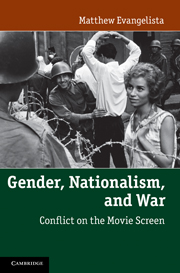Book contents
- Frontmatter
- Contents
- List of figures
- Preface
- 1 Virginia Woolf's purse
- 2 Algeria: a world constructed out of ruins
- 3 Yugoslavia: archetype or anomaly?
- 4 Chechnya: virgins, mothers, and terrorists
- 5 Québec: oui, no, or femme
- 6 “To live to see better times”: gender, nationalism, sovereignty, equality
- Index
- References
2 - Algeria: a world constructed out of ruins
Published online by Cambridge University Press: 05 June 2012
- Frontmatter
- Contents
- List of figures
- Preface
- 1 Virginia Woolf's purse
- 2 Algeria: a world constructed out of ruins
- 3 Yugoslavia: archetype or anomaly?
- 4 Chechnya: virgins, mothers, and terrorists
- 5 Québec: oui, no, or femme
- 6 “To live to see better times”: gender, nationalism, sovereignty, equality
- Index
- References
Summary
Do you know something Ali? Starting a revolution is hard, and it's even harder to continue it. Winning is hardest of all. But only afterward, when we have won, will the real hardships begin.
Larbi Ben M'hidi, in Gillo Pontecorvo's The Battle of Algiers (1966)Perhaps a new world is being constructed out of ruins, a world where women will be wearing pants, literally and figuratively, a world where what remains of the old traditions that adhere to the inviolability of women, both literally and figuratively, will be viewed as a nuisance and swept away.
Mouloud Feraoun, journal entry, April 3, 1958In Three Guineas, Virginia Woolf identified many reasons for women to opt out of the traditionally male pursuit of warfare. She attributed war to the status-seeking behavior of men, whether in the business world, in higher education, or in the clergy, and she hoped that peace would come when women rejected the hierarchical, competitive, masculine world, and formed a community of Outsiders. Having faced discrimination at home, in the ownership of property, in educational opportunities, and in the workplace, women would appear to have no reason to value their country over any other one and thus to share none of the nationalist sentiment that seemed to drive men to fight. This line of argument produces the slogan by which the book is probably best known: “As a woman I have no country.”
- Type
- Chapter
- Information
- Gender, Nationalism, and WarConflict on the Movie Screen, pp. 25 - 79Publisher: Cambridge University PressPrint publication year: 2011

